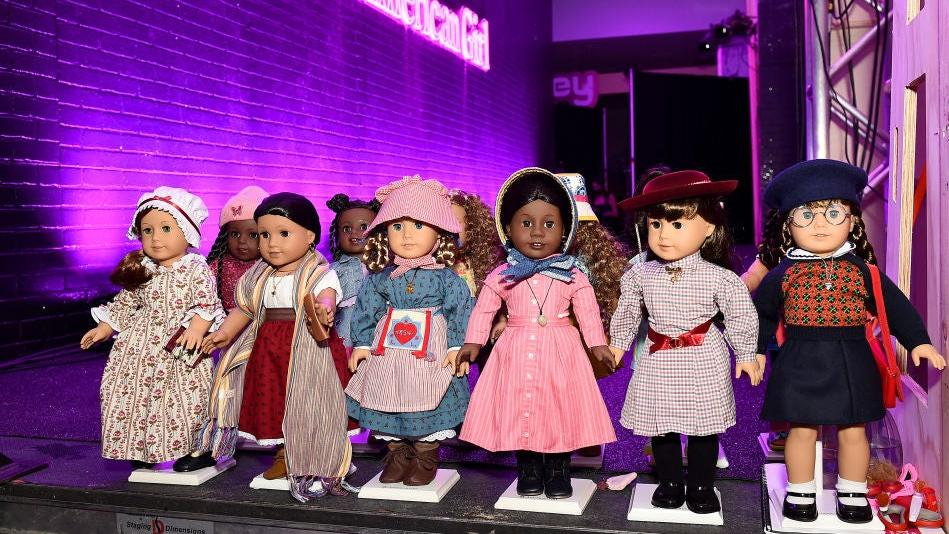Influencers, Back The Hell Away From The American Girl Cafe
This wholesome girlhood beacon is no place for your irreverent martini pics.
When I was nine, I begged my parents for an American Girl doll. Not just any American Girl doll—I wanted a Just Like Me doll. These dolls were highly customizable, giving the recipient the godlike power to create a doll in their image. Of course, I took the customization too far, creating a doll that sported the features I lacked but desperately wanted. (Bright blue eyes, strawberry blonde ringlets. My doll was hot as hell.) But that's part of what makes American Girl dolls so special: they're a vessel for imagination. Unless you're a pouty-lipped influencer, in which case I'm gonna need you to put the doll down and back away from the American Girl Cafe.
Influencers are using American Girl for clout
I'll explain. The New York Times recently published an article entitled "Dolls and Drinks for Likes and Clicks." The article followed several grown-ass adult influencers as they infiltrated New York City's American Girl Cafe for clout. The Times writes:
On a Monday morning in February, Harry Hill, 27, showed up at the American Girl Cafe wearing a vintage Christian Dior sweater and carrying a Coach tote that held two of his beloved dolls. He was joined by Serena Kerrigan, 27, who brought her dolls in a pink mesh Victoria's Secret bag.
Hill and Kerrigan are reportedly fixtures in the American Girl fanverse; Hill dressed as the prissy Samantha doll for Halloween; Kerrigan made a TikTok in which she got her doll checked for sexually transmitted diseases at the store's doll hospital. The Times reporter documented the pair snapping selfies at the cafe, which was "mostly empty apart from five other parties, each made up of children and their chaperones."
Hill and Kerrigan are far from the only adults imbibing at the American Girl Cafe. Conan's done it. More recently, comedian Sally Darr Griffin posted a TikTok video titled "American Girls grow into American Women" in which she invites the viewer to watch her "getting absolutely obliterated at the American Girl Doll Cafe." In the video, Griffin plays the part of a vocally fried influencer, shouting out a few brands and clinking teacups with her pals. This, I can get behind. It's a very fun mockery of influencers like Hill and Kerrigan.
But who are Hill and Kerrigan mocking?
Their American Girl content is clearly irreverent, not meant to be taken even the tiniest bit seriously. Kerrigan's proclamation that she's dressed in "head-to-toe Zara" is enough to signal that the whole thing is a big joke; meanwhile, in an interview with the Times, Hill called the American Girl cafe "Disneyland for literary girls and gays," a sentiment which is both extremely funny and impossible to decipher. (Either way, I will be incorporating "Disneyland for literary girls and gays" into my everyday vernacular.)
But good satire has an unmistakable target, and Hill and Kerrigan's target is unclear. A generous viewer might assume that Hill and Kerrigan are satirizing themselves and the obnoxious influencer culture that pays their bills—but I'm of the belief that they're satirizing the very nature of American Girl fans of all ages.
American Girl is not camp
Either way, the brand is definitely not in on the joke. Jamie Cygielman, the president of American Girl, wrote in a statement, "We know our devoted fans never forget the beloved American Girl characters and stories they grew up with, and we're thrilled to have them reconnect and reminisce with us as adults."
I imagine Hill and Kerrigan reading Cygielman's statement and chuckling drily, perhaps even labeling it as camp. But there's nothing campy about irreverent influencers infiltrating what should be a joyful space for kids to dine with their dolls. To the eight-year-old enjoying a birthday luncheon at the next table over, Hill and Kerrigan's very clear mockery of the cafe doesn't feel campy—it feels bitchy. It awakens a sort of vague embarrassment, even though, at eight, you're not sure why you should feel embarrassed.
I feel that vague embarrassment more and more these days as internet culture warps our understanding of appropriate satirical targets. I'm disgustingly online, as are most of my friends—which is why I receive dozens of Twitter DMs a day that read "lmaoooo." More often than not, the subject of the "lmaoooo" is something vaguely confusing—something I'm not sure I should be laughing at. The most recent example that comes to mind is Juergen Teller's photoshoot with actress Julia Fox, which I saw described as "exploitative" while others insisted it was "camp." Is it camp if you make your subject look like absolute shit?
Thus far, the baffling irreverence of internet culture has failed to taint the American Girl brand. The brand still promises to "bring out the joy of girlhood," promoting "adventurous stories and imaginative play." Unfortunately, you can't engage in imaginative play if you're busy "curating the vibe" by posting about how your American Girl doll has a dump truck ass.
My biggest fear is that the presence of flippant internet gargoyles in childhood spaces like the American Girl Cafe will rob kids of the ability to move through the world unafraid of expressing themselves. Kids are impressionable little weirdos. If they see an influencer laughing, they'll want to know what's funny. It'd be a real tragedy if they realize that they're the joke.
